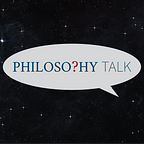Questioning the Existence of the Self — Is There Such a Thing?
by Joshua Landy
Is there such a thing as a self, something that makes you who you are? Or is the self just a convenient fiction? Would the world be a better place if we all stopped believing in selves? These are some of the questions we’re asking in this show.
Eighteenth-century philosopher David Hume certainly believed the self was just an illusion. “When I enter most intimately into what I call myself,” he said, “I always stumble on some particular perception or other… I can never catch myself.” There’s also a wonderful Buddhist story that runs along similar lines. A chariot, says Nagasena, is just wheels, axles, and a seat — there’s no additional thing called a chariot. So too, an individual is just her feelings, perceptions, desires, and beliefs: there’s no “self” over and above those parts.
Paul Ricoeur had a lovely answer to Hume: when you say “I always stumble,” dear David, who is this “I” you’re referring to? What is this thing in you that always sees something and never catches something else? If you were a different being each time you noticed something, how could you put all the noticings together into a never and an always? (Fans of Immanuel Kant will recognize shades of his “unity of apperception” here.)
As for Nagasena, well, chariots don’t have memories of childhood. But human beings do. As John Locke pointed out, each of us remembers our past, and we remember it in a special way: someone else can find out things about the time my sibling broke my arm, but they’ll never be able to feel it the way I do when I remember it. And the reason for that is because I’m the same person. There’s something that has persisted throughout all these years: me.
Chariots also don’t have personalities. And people generally do. In fact, it’s remarkable how well we are able to predict how our friends and family will react in many situations. (“Your mother is going to flip!”) We know just who will help us move house, and just who, as the saying goes, will help us move a body. We know who will give us brutally honest feedback, and we know who will spare our feelings. Of course, some of that is due to people putting on an act in society, but surely some of it has to do with temperament, with the character that people have fashioned out of their gifts and inclinations and aversions and ideals.
It’s true that some of these inclinations, aversions, and ideals change over time, and some are foisted on us by society. But the very fact that we can talk like that — “foisted on us by society“ — suggests that we make a distinction between the authentic and the inauthentic, what’s merely convention and what’s really me. Don’t we want to perform actions that are authentic — actions, that is, that are true to ourselves? And how could we do that if we didn’t believe in a self to be true to?
When it comes to decisions about the future, it’s not just a question of authenticity: it’s also a question of fulfillment. Would it be smart of me to quit my job as a teacher and go join the Golden State Warriors? My Magic 8-Ball says “ask again later,” but I really don’t think I need a second opinion. I know things would go badly for me at the Warriors. I know that because I know myself (at least that much). I can know myself because there is a self to know.
This is also, ideally, how we choose who to spend our life with. We need to know something about the other person’s personality (her self), and we also need to know something about our own personality (our self). Nothing is for certain in this world, but radical self-ignorance is probably not a good recipe for success.
So human beings are not, in the end, much like chariots. And to be honest, I’m not even sure the chariot is such a great example for Nagasena’s point. Is a chariot really just a collection of wheels, axles, and seats? Imagine those same wheels, axles, and seats scattered on the floor. Would they get you from A to B? A chariot isn’t just a set of parts: it’s an organization of those parts. And parts, when organized, sometimes form a new object. You can do things with a chariot that you can’t do with a bunch of seats, wheels, and axles lying on the floor. The organized object produces real effects in the world. So why not call it a new thing?
One final question: regardless of whether the self is real, is it a good thing to believe that it is? Again, I can see arguments on either side. Believing in the reality of a self might well help people to embark on long-range plans that give them hope and excitement and fulfillment and pride; some of those people might end up making important discoveries and inventions to bring to the world; and they might feel encouraged to keep their promises and take responsibility for their past misdeeds.
On the other hand, following Nagasena might make people feel freer to start out on new paths, less obsessed with fame and reputation, more compassionate, more connected with everyone and everything around them, and more generous because (literally) more selfless. Maybe it’s a good thing to believe in the self even if it doesn’t really exist. Or maybe it’s a good thing to doubt it even if it does!
This blog originally appeared on Philosophy Talk.
